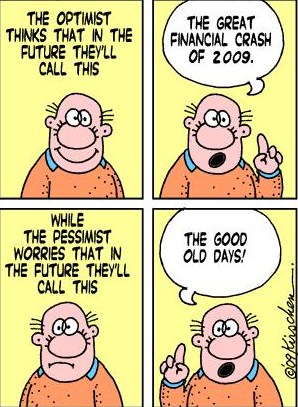Most of our readers have experienced a great deal of stress over the last few years. Figuring out how to first survive, and then somehow thrive has probably added at least a few gray hairs to your head. 
Along those lines, I’m wondering how the market is affecting your health? In a recent update, Dr. Martin Seligman describes with powerful evidence why the impact will be very different on some of you than on others, depending on your level of optimism:
“In the mid-1980s, 120 men from San Francisco had their first heart attacks, and they served as the untreated control group in the massive Multiple Risk Factor Intervention Trial (acronymic MR FIT) study. This study disappointed many psychologists and cardiologists by ultimately finding no effect on CVD (Cardio Vascular disease) by training to change these men’s personalities from type A (aggressive, time urgent, and hostile) to type B (easy going). The 120 untreated controls, however, were of great interest to Gregory Buchanan, then a graduate student at Penn, and to me because so much was known about their first heart attacks: extent of damage to the heart, blood pressure, cholesterol, body mass, and lifestyle—all the traditional risk factors for cardiovascular disease. In addition, the men were all interviewed about their lives: family, job, and hobbies. We took every single 'because' statement from each of their videotaped interviews and coded it for optimism and pessimism.
Within eight and a half years, half the men had died of a second heart attack, and we opened the sealed envelope. Could we predict who would have a second heart attack? None of the usual risk factors predicted death: not blood pressure, not cholesterol, not even how extensive the damage was from the first heart attack. Only optimism, eight and a half years earlier, predicted a second heart attack; of the sixteen most pessimistic men, fifteen died. Of the sixteen most optimistic men, only five died.
This finding has been repeatedly confirmed in larger studies of cardiovascular disease, using varied measures of optimism”
There are many more studies like this if you’d like to read more of the book... Seligman goes on to describe that many guessed, wrongly it turns out, that these studies must have been measuring depression in the pessimists and that is what killed them. But read on…
“Is depression the real culprit? Pessimism, in general, correlates pretty highly with depression, and depression, in many studies, also correlates with cardiovascular disease. So you might wonder if the lethal effect of pessimism works by increasing depression. The answer seems to be no, since optimism and pessimism exerted their effects even when depression was held constant statistically.
All studies of optimism and CVD converge on the conclusion that optimism is strongly related to protection from cardiovascular disease. This holds even correcting for all the traditional risk factors such as obesity, smoking, excessive alcohol use, high cholesterol, and hypertension. It even holds correcting for depression, correcting for perceived stress, and correcting for momentary positive emotions. It holds over different ways of measuring optimism. Most importantly, the effect is bipolar, with high optimism protecting people compared to the average level of optimism and pessimism, and pessimism hurting people compared to the average.
Why optimists are less vulnerable to disease: How might optimism work to make people less vulnerable and pessimism to make people more vulnerable to cardiovascular disease? The possibilities divide into three large categories:
- Optimists take action and have healthier lifestyles. Optimists believe that their actions matter, whereas pessimists believe they are helpless and nothing they do will matter. Optimists try, while pessimists lapse into passive helplessness. Optimists therefore act on medical advice readily…they also take action to avoid bad events, whereas pessimists are passive.
- Social support. The more friends and the more love in your life, the less illness. George Vaillant found that people who have one person whom they would be comfortable calling at three in the morning to tell their troubles, were healthier. John Cacioppo found that lonely people are markedly less healthy than sociable people. In an experiment, participants read a script over the phone to strangers—reading in either a depressed voice or a cheerful voice. The strangers hang up on the pessimist sooner than on the optimist.
- Biological mechanisms. There are a variety of plausible biological paths. One is the immune system. Judy Rodin, Leslie Kamen, Charles Dwyer, and I collaborated together in 1991 and took blood from elderly optimists and pessimists, and tested the immune response. The blood of optimists had a feistier response to threat —more infection-fighting white blood cells called T lymphocytes produced—than the pessimists. Another potential biological path is a pathological circulatory response to repeated stress. Pessimists give up and suffer more stress, whereas optimists cope better with stress. Repeated episodes of stress, particularly when one is helpless, likely mobilize the stress hormone cortisol and other circulatory responses that induce or exacerbate damage to the walls of blood vessels and promote atherosclerosis. Repeated episodes of stress and helplessness might set off a cascade of processes involving higher cortisol and lower levels of the neurotransmitters known as catecholamines, leading to long-lasting inflammation. Greater inflammation is implicated in atherosclerosis, and women who score low in feelings of mastery and high in depression have been shown to have worse calcification of the major artery, the trunk-like aorta."
My hope is that at least some of you have discovered a great deal about yourself during this challenging time in our little piece of history. If you’re an optimist, there are additional perks to come, if they haven’t already. There's plenty of research that says you'll experience success. So continue to work hard.
For those pessimists, you might benefit from reading Dr. Seligman's book, Learned Optimism: How to Change Your Mind and Your Life, or read the main source of this article: Flourish: A Visionary New Understanding of Happiness and Well-Being.




Comments